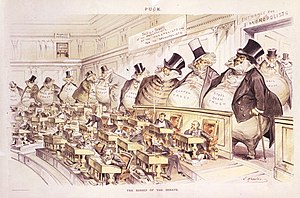
In the United States, antitrust law is a collection of mostly federal laws that regulate the conduct and organization of businesses in order to promote competition and prevent unjustified monopolies. The three main U.S. antitrust statutes are the Sherman Act of 1890, the Clayton Act of 1914, and the Federal Trade Commission Act of 1914. These acts serve three major functions. First, Section 1 of the Sherman Act prohibits price fixing and the operation of cartels, and prohibits other collusive practices that unreasonably restrain trade. Second, Section 7 of the Clayton Act restricts the mergers and acquisitions of organizations that may substantially lessen competition or tend to create a monopoly. Third, Section 2 of the Sherman Act prohibits monopolization.[2]
Federal antitrust laws provide for both civil and criminal enforcement. Civil antitrust enforcement occurs through lawsuits filed by the Federal Trade Commission (FTC), the Antitrust Division of the U.S. Department of Justice, and private parties who have been harmed by an antitrust violation. Criminal antitrust enforcement is done only by the Justice Department's Antitrust Division. Additionally, U.S. state governments may also enforce their own antitrust laws, which mostly mirror federal antitrust laws, regarding commerce occurring solely within their own state's borders.
The scope of antitrust laws, and the degree to which they should interfere in an enterprise's freedom to conduct business, or to protect smaller businesses, communities and consumers, are strongly debated. Some economists argue that antitrust laws actually impede competition,[3] and may discourage businesses from pursuing activities that would be beneficial to society.[4] One view suggests that antitrust laws should focus solely on the benefits to consumers and overall efficiency, while a broad range of legal and economic theory sees the role of antitrust laws as also controlling economic power in the public interest.[5] Surveys of American Economic Association members since the 1970s have shown that professional economists generally agree with the statement: "Antitrust laws should be enforced vigorously."[list 1]
- ^ Published in Puck (23 January 1889)
- ^ For a general framework, see Thibault Schrepel, A New Structured Rule of Reason Approach for High-Tech Markets, Suffolk University Law Review, Vol. 50, No. 1, 2017 at https://ssrn.com/abstract=2908838
- ^ The Business Community's Suicidal Impulse by Milton Friedman Archived 2021-08-15 at the Wayback Machine A criticism of antitrust laws and cases by the Nobel economist
- ^ "Memo, 6-12-98; Antitrust by Alan Greenspan". Archived from the original on 2005-12-17. Retrieved 2005-12-23.
- ^ See generally Herbert Hovenkamp, 'Chicago and Its Alternatives' (1986) 6 Duke Law Journal 1014–1029, and RH Bork, The Antitrust Paradox (Free Press 1993.)
- ^ Kearl, J. R.; Pope, Clayne L.; Whiting, Gordon C.; Wimmer, Larry T. (1979). "A Confusion of Economists?". American Economic Review. 69 (2). American Economic Association: 28–37. JSTOR 1801612.
- ^ Alston, Richard M.; Kearl, J.R.; Vaughan, Michael B. (May 1992). "Is There a Consensus Among Economists in the 1990's?" (PDF). The American Economic Review. 82 (2): 203–209. JSTOR 2117401.
- ^ Fuller, Dan; Geide-Stevenson, Doris (Fall 2003). "Consensus Among Economists: Revisited". The Journal of Economic Education. 34 (4): 369–387. doi:10.1080/00220480309595230. JSTOR 30042564.
- ^ Fuller, Dan; Geide-Stevenson, Doris (2014). "Consensus Among Economists – An Update". The Journal of Economic Education. 45 (2). Taylor & Francis: 138. doi:10.1080/00220485.2014.889963. S2CID 143794347.
- ^ Geide-Stevenson, Doris; La Parra-Perez, Alvaro (2022). Consensus among economists 2020 – A sharpening of the picture. Western Economic Association International Annual Conference. Retrieved October 13, 2023.
Cite error: There are <ref group=list> tags on this page, but the references will not show without a {{reflist|group=list}} template (see the help page).